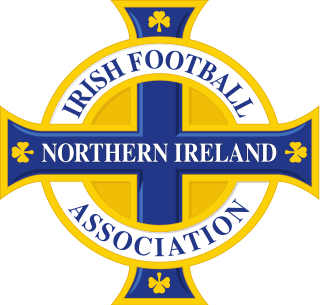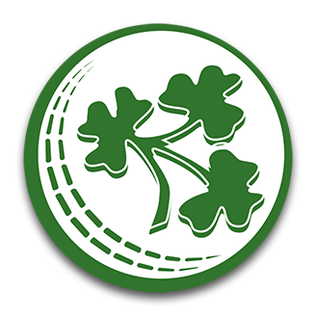
The England national football team have represented England in international football since the first international match in 1872. It is controlled by the Football Association (FA), the governing body for football in England, which is affiliated with UEFA and comes under the global jurisdiction of world football's governing body FIFA. England competes in the three major international tournaments contested by European nations: the FIFA World Cup, the UEFA European Championship and the UEFA Nations League.

The 1999 Rugby World Cup, was the fourth Rugby World Cup, the quadrennial international rugby union championship, the first World Cup to be held in the sport's professional era.

The Northern Ireland national football team represents Northern Ireland in men's international association football. From 1882 to 1950, all of Ireland was represented by a single side, the Ireland national football team, organised by the Irish Football Association (IFA). In 1921, the jurisdiction of the IFA was reduced to Northern Ireland following the secession of clubs in the soon-to-be Irish Free State, although its team remained the national team for all of Ireland until 1950, and used the name Ireland until the 1970s. The Football Association of Ireland (FAI) organises the separate Republic of Ireland national football team.

The Scotland national football team represents Scotland in men's international football and is controlled by the Scottish Football Association. They compete in three major professional tournaments: the FIFA World Cup, UEFA Nations League, and the UEFA European Championship. Scotland, as a country of the United Kingdom, are not a member of the International Olympic Committee, and therefore the national team does not compete in the Olympic Games. The majority of Scotland's home matches are played at the national stadium, Hampden Park.

The Republic of Ireland national football team represents the Republic of Ireland in men's international football. It is governed by the Football Association of Ireland (FAI).

The Croatia national football team represents Croatia in international football matches. It is governed by the Croatian Football Federation (HNS), the governing body for football in Croatia. It is a member of UEFA in Europe and FIFA in global competitions. The team's colours reference two national symbols: the Croatian checkerboard and the country's tricolour. They are colloquially referred to as the Vatreni (Blazers) and Kockasti.

The Scotland national rugby union team represents the Scottish Rugby Union in men's international rugby union. The team takes part in the annual Six Nations Championship, where they are the current Calcutta Cup and Doddie Weir Cup holders. They also participate in the Rugby World Cup, which takes place every four years.

The Scotland national rugby league team represent Scotland in international rugby league football tournaments. Following the break-up of the Great Britain team in 2007, Scottish players play solely for Scotland, apart from occasional Southern Hemisphere tours, for which the Great Britain team is expected to be revived. The team is nicknamed the Bravehearts.

Tomislav "Tomo" Šokota is a Croatian former footballer who played as a striker. Šokota was a powerful striker but his promising career was overshadowed by frequent injuries, especially in second half of the 2000s. Šokota gave his best performances during his first spell with Dinamo Zagreb (1997–2001) and at Portuguese side Benfica (2001–2005). He was also a Croatia international, capped eight times during the team's Euro 2004 campaign.

The Ireland men's cricket team represents All-Ireland in international cricket. The Irish Cricket Union, operating under the brand Cricket Ireland, is the sport's governing body in Ireland, and they organise the international team. The team have a number of home grounds, including Malahide in County Dublin, Stormont, Belfast, Bready in the north-west and Clontarf in Dublin city. A further ground is planned for the National Sports Campus in Abbotstown, Dublin for 2030. Due to the short season allowed by the Irish climate, and lack of large scale facilities, Ireland also occasionally play 'home matches' in venues in England and further abroad.

The Afghanistan men's national cricket team represents Afghanistan in men's international cricket. It is a full Member of the International Cricket Council (ICC) with Test, One-Day International (ODI) and T20 International (T20I) status.
The Euro Cup is an international Australian rules football tournament played between European national teams. Played under nine-a-side footy rules, the tournament was first held at Chiswick in London, England in 2005, created by Australian Football International. A women's cup has been played between more than two teams since the 2014 tournament.

Australian rules football is played in Europe at an amateur level in a large number of countries. The oldest and largest leagues are those in the United Kingdom, Ireland and Denmark, in each of these nations there are several established clubs, and organised men's, women's and juniors programs. The British AFL has now expanded into Welsh, Scottish and English leagues. The Danish AFL has been responsible for the expansion of Australian Football into Sweden, Finland, Iceland and Norway. The governing body for Australian Football in Europe was founded in Frankfurt in January 2010; the body was initially called the European Australian Football Association, but changed its name to AFL Europe at a general assembly meeting in Milan in October of the same year. It currently has 22 member nations. AFL Europe, with backing of the AFL in Australia has overseen a large improvement in the organisation of Australian football in Europe.
The Tertiary Student Rugby League World Cup, also known as the University Rugby League World Cup, first took place in 1986 in New Zealand, when the then five test nations each entered a side in what was the first non-first grade World Cup hosted by the Rugby League International Federation.

The British and Irish Cup was an annual rugby union competition for second tier, semi-professional clubs and the reserves or developing teams from professional clubs from Great Britain and Ireland. It took place for the first time in the 2009–10 season, and ran for 9 seasons.
The FIFA World Cup is an international association football competition contested by the men's national teams of the members of the Fédération Internationale de Football Association (FIFA), the sport's global governing body. The tournament has been contested every four years since 1930, except in 1942 and 1946, due to the Second World War.
The Republic of Ireland national futsal team has represented the Republic of Ireland in the UEFA Futsal Championship. The Republic of Ireland has, to date, never qualified for the final stages of a major tournament. It has, however, taken part in several invitational tournaments, such as the 2008 Four Nations Futsal Cup. It is organised by the Football Association of Ireland.
The 2010 Euro Cup of Australian rules football was held in Milan (Italy) on 2 October 2010, with 15 national teams. For the first time a women's international match took place during the competition.
The 2012 Euro Cup of Australian rules football was a 9-a-side Footy tournament held in Edinburgh (Scotland) on 22 September 2012, with 16 national men's teams and two women's teams. The men's tournament was won by Ireland who defeated Denmark in the Grand Final by 1 point to claim its second EU Cup Championship. Denmark's Aksel Bang was named Player of the Tournament and was the Leading Goal Kicker.












